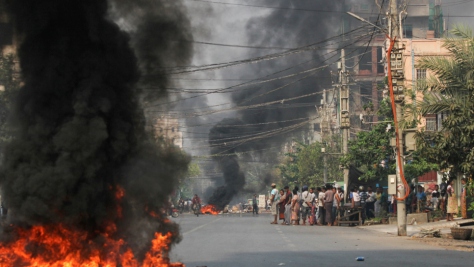Men, women and children suffering from harsh physical conditions and legal shortcomings at Pacific Island asylum centres: UNHCR reports
This is a summary of what was said by UNHCR spokesperson Adrian Edwards – to whom quoted text may be attributed – at today's press briefing at the Palais des Nations in Geneva.
In two reports released today, UNHCR finds that asylum-seekers transferred from Australia to processing centres at Nauru and Manus Island in Papua New Guinea (PNG) are living in arbitrary detention in conditions that do not meet international standards of treatment.
UNHCR understands Australia's determination to respond robustly to the challenges of people smuggling and to dissuade people from undertaking dangerous irregular travel by sea. However we believe those responses must not neglect the compelling protection needs, safety and dignity of the individuals affected.
These reports are also in the context of what UNHCR has observed to be a sharp deterioration during 2013 in the overall quality of protection and support available to asylum-seekers and refugees who come to Australia by boat. It remains the case that when policies and practices are based primarily on deterrence, they can have harmful and, at times, punishing consequences for people affected, particularly families and children.
The reports identify troubling shortcomings at both centres, and urge all three States involved to consider the findings and recommendations and act upon them.
In both Nauru and PNG the current policies, operational approaches and harsh physical conditions at the centres not only do not meet international standards - they also have a profound impact on the men, women and children housed there.
UNHCR is concerned that they constitute mandatory detention which is not compatible with international law. We are also worried that they do not provide a fair and efficient system for assessing refugee claims, do not provide safe and humane conditions of treatment in detention, and do not provide for adequate and timely solutions for recognized refugees.
With the Nauru report, it acknowledges some positive developments since our last visit in March. However, there have also been significant setbacks in refugee processing, and a deterioration in reception conditions. Despite a processing system being in place under Nauru law, only one decision has been handed down in the 14 months since the centre reopened.
No decisions at all have been finalized at the centre in PNG, and while some improvements were observed since UNHCR's last inspection in June, the physical conditions within detention, together with the slowness of processing and the lack of clarity regarding safe and sustainable solutions for refugees were likely, together, to have a serious and negative effect on the health and welfare of people transferred from Australia.
At both centres, the psycho-social well-being of vulnerable people - including survivors of torture and trauma and unaccompanied children - is an issue of concern. UNHCR also called on all three States not to transfer children, particularly those who are unaccompanied, unless and until there has been a marked improvement in conditions in both centres.
UNHCR is particularly concerned by the impact of policies that will prevent recognized refugees from finding safe, dignified and sustainable solutions in the medium to long term. The prospect for refugees in PNG finding permanent protection there presents formidable challenges, and it is clear that Nauru will offer only very limited opportunities for refugees even in the shorter term.
UNHCR believes the arrangements at Nauru and PNG would benefit from a much clearer articulation of the policy and operational framework that would set out how, when and where refugees will be able to secure protection and exercise the rights required under the 1951 Refugee Convention.
The full reports, including recommendations, are available at: www.unhcr.org.au
For more information on this topic, please contact:
- In Canberra (Regional): Ben Farrell on mobile +61 407 971 686
- In Geneva: Adrian Edwards on mobile +41 79 557 91 20
- Babar Baloch on mobile +41 79 557 9106
Related news and stories
Global photo project shows power of football during displacement
The Kenyan powerhouse improving women's lives in Australia
UN refugee chief welcomes cities' support for refugees
UNHCR appeals to Australia to act and save lives at immediate risk
UNHCR urges Australia to end separation of refugee families
'We must believe we can make a difference and we can do things better' - Andrew Harper
-

Fresh start for Malian refugees in Burkina Faso as camp reopens
1 Apr 2021 The Goudoubo camp, empty after violence forced residents out, now bustles as schools and healthcare centres rebuild and businesses reopen. -

Hundreds of thousands displaced by violence in northern Mozambique
1 Apr 2021 -

Disability, Displacement and Climate Change
Apr 2021 Climate change may lead to a higher risk of forced displacement through an increased frequency and intensity of extreme weather events. People with disabilities face heightened protection risks and barriers to inclusion. -

News Comment: Six refugees among 137 killed in Niger's recent attack
1 Apr 2021 This news comment is attributable to Gillian Triggs, UNHCR's Assistant High Commissioner for Protection -

Evaluation of the Telling the Real Story Project 2.0
Apr 2021 Telling the Real Story 2.0 is a UNHCR project that focuses on Communicating with Communities (CwC), who are at risk of irregular movement. This evaluation seeks to provide accountability and learning, support UNHCR's fulfilment of its commitments to the donor and provide important lessons learned for UNHCR in replicating and/or scaling up its CwC initiatives in the context of the organization's regionalization/decentralization process. Attachments: ES/2021/02 Management response and Annexes (.zip) -

Youth with Refugees Art Contest
31 Mar 2021 -

Malian refugees are given a chance to start a new home
31 Mar 2021 -

Template for ball design.
31 Mar 2021 -

News comment: UNHCR calls on Myanmar's neighbours to protect people fleeing violence
31 Mar 2021 This news comment is attributable to Gillian Triggs, UNHCR's Assistant High Commissioner for Protection
